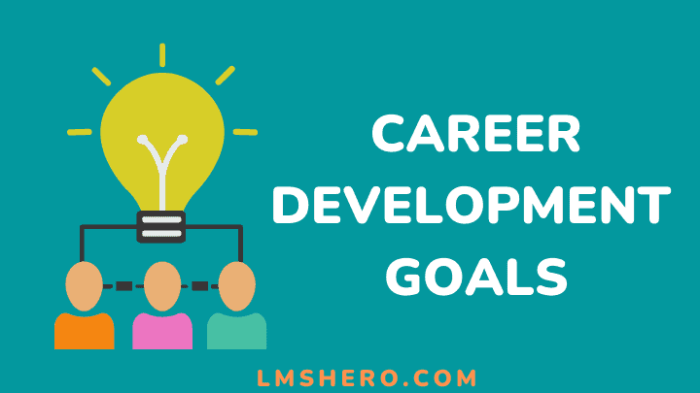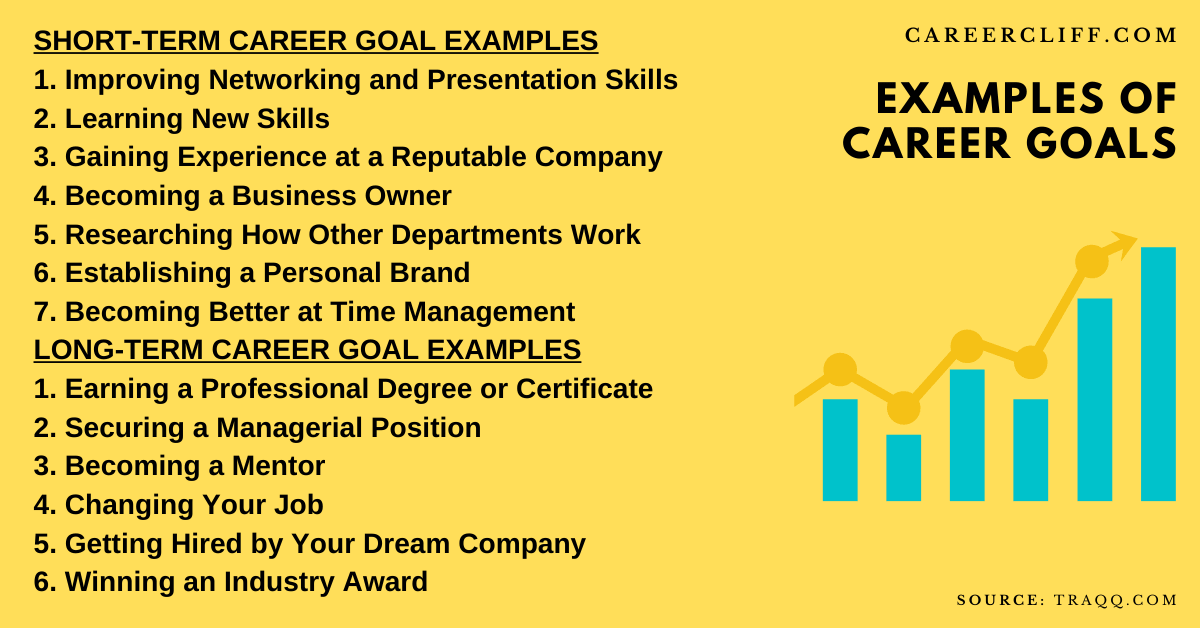Career Development Goals set the path for your future success, guiding you towards new heights in your professional journey. Whether you’re aiming for a promotion, skill enhancement, or educational growth, these goals shape your destiny. Let’s dive into the world of career aspirations and growth!
Importance of Career Development Goals
Setting career development goals is crucial for professional growth as it provides a roadmap for individuals to progress in their careers. By establishing clear objectives, individuals can focus their efforts, stay motivated, and track their achievements over time.
Impact on Career Trajectory
- Setting short-term and long-term career development goals can help individuals stay focused and motivated, leading to increased productivity and job satisfaction.
- Having clear goals can also make it easier to make decisions about which opportunities to pursue and which ones to pass on, ultimately shaping one’s career trajectory.
- Individuals who actively work towards their career development goals are more likely to advance in their careers, take on new challenges, and reach higher levels of success.
Aligning Aspirations with Goals
- When personal aspirations are aligned with career development goals, individuals are more likely to find fulfillment and satisfaction in their work.
- By setting goals that reflect personal values and interests, individuals can create a career path that is meaningful and rewarding.
- Aligning aspirations with career goals can also lead to a better work-life balance and overall well-being, as individuals are more likely to pursue opportunities that align with their passions and values.
Types of Career Development Goals

Career development goals can be categorized into different types based on their focus and timeline. These categories include skill-based goals, promotion-focused goals, and education-oriented goals. It is important to set a mix of short-term and long-term goals to ensure continuous growth and progress in your career.
Skill-based Career Development Goals
Skill-based goals focus on developing specific skills or improving existing ones to enhance your performance in your current role or to prepare for future opportunities. Examples of SMART skill-based career development goals include:
- Complete a certification course in project management within the next six months to improve leadership skills.
- Enhance communication skills by attending a public speaking workshop every quarter for the next year.
Promotion-focused Career Development Goals
Promotion-focused goals are aimed at advancing to a higher position within your organization or transitioning to a new role with more responsibilities. Examples of SMART promotion-focused career development goals include:
- Obtain a supervisory role within the next two years by consistently exceeding performance targets and taking on leadership opportunities.
- Develop a strategic plan for career advancement by seeking mentorship from senior leaders in the organization within the next three months.
Education-oriented Career Development Goals
Education-oriented goals involve acquiring new knowledge or furthering your education to stay relevant in your field or to explore new career paths. Examples of SMART education-oriented career development goals include:
- Complete a Master’s degree in Business Administration within the next four years to qualify for leadership positions.
- Attend industry-related workshops and conferences to stay updated on the latest trends and technologies in the field at least twice a year.
Strategies for Setting Career Development Goals
Setting career development goals requires careful planning and self-reflection to ensure success in achieving them. By identifying personal strengths and weaknesses, creating a career development plan, and setting realistic timelines, individuals can pave the way for a fulfilling career journey.
Identifying Personal Strengths and Weaknesses
Before setting career development goals, it’s crucial to assess your strengths and weaknesses. This self-reflection helps in determining areas where you excel and areas that need improvement.
- Take personality assessments or career quizzes to gain insights into your strengths and weaknesses.
- Seek feedback from mentors, colleagues, or supervisors to understand how others perceive your skills and abilities.
- Reflect on past experiences and achievements to identify patterns of success and areas for growth.
Creating a Career Development Plan
Once you have a clear understanding of your strengths and weaknesses, it’s time to create a career development plan that Artikels actionable steps towards achieving your goals.
- Set specific, measurable, achievable, relevant, and time-bound (SMART) goals that align with your strengths and address areas of improvement.
- Break down long-term goals into smaller milestones to track progress and stay motivated.
- Identify resources, such as training programs, networking opportunities, or certifications, that can help you develop the skills needed to reach your goals.
Prioritizing and Setting Realistic Timelines
Setting realistic timelines is key to staying focused and accountable in achieving your career development goals. Prioritizing tasks and setting achievable deadlines can help you make steady progress.
- Rank your goals based on importance and urgency to focus your efforts on high-priority tasks.
- Break down larger goals into smaller actionable steps with deadlines to ensure steady progress.
- Regularly review and adjust your timelines as needed to stay on track and adapt to changing circumstances.
Monitoring and Adjusting Career Development Goals
Tracking your progress towards your career development goals is crucial to ensure that you are on the right path and making meaningful strides towards your desired outcome.
Importance of Tracking Progress
It is essential to regularly evaluate your current goals to determine if they are still relevant and align with your career aspirations. By monitoring your progress, you can identify areas where you may need to adjust your goals or strategies to stay on track.
- Set specific milestones to measure your progress along the way.
- Reflect on your achievements and challenges to gain insights into what is working and what needs improvement.
- Seek feedback from mentors or colleagues to gain a different perspective on your progress.
Evaluating and Adjusting Goals
When evaluating the effectiveness of your current goals, consider whether they are still relevant, achievable, and in alignment with your long-term career objectives. If necessary, be prepared to make adjustments to your goals to ensure they remain challenging yet attainable.
“Success is the result of perfection, hard work, learning from failure, loyalty, and persistence.” – Colin Powell
- Regularly review your goals and assess if they are still challenging enough to motivate you.
- Be open to modifying your goals based on changing circumstances or new opportunities that arise.
- Seek guidance from career counselors or coaches to help you make informed decisions about adjusting your goals.
Reassessing and Redefining Goals
As circumstances change in your career or personal life, it is important to reassess and potentially redefine your career development goals to ensure they remain relevant and achievable. Embrace flexibility and adaptability to navigate unexpected challenges or opportunities that may impact your goals.
- Regularly review your goals in light of any changes in your industry or job market.
- Consider seeking additional training or education to support new career goals or directions.
- Stay proactive in seeking feedback and guidance to help you navigate changes and make informed decisions about your career path.
Overcoming Challenges in Achieving Career Development Goals
In the pursuit of career development goals, individuals often face various obstacles that can hinder their progress. It is essential to stay motivated and resilient in the face of setbacks to ultimately achieve success. Mentorship and feedback play a crucial role in providing guidance and support during challenging times.
Common Obstacles in Pursuing Career Development Goals
- Uncertainty about the future and fear of failure can lead to indecision and lack of progress.
- External factors such as economic instability or job market changes may impact career opportunities.
- Work-life balance issues can cause distractions and hinder focus on career development goals.
Tips for Staying Motivated and Overcoming Setbacks
- Set short-term goals to maintain momentum and track progress effectively.
- Seek support from mentors or career coaches to gain valuable insights and guidance.
- Stay positive and resilient in the face of challenges, focusing on the long-term benefits of achieving your career goals.
Role of Mentorship and Feedback in Achieving Career Development Goals
Mentorship provides individuals with valuable advice, encouragement, and feedback to navigate challenges and make informed decisions. Feedback helps in identifying areas for improvement and learning from past experiences, ultimately leading to personal and professional growth.
Celebrating Success and Setting New Career Development Goals

It’s crucial to take a moment to acknowledge and celebrate your achievements related to career development goals. Recognizing your hard work and dedication can boost your confidence and motivation to continue striving for success.
Reflecting on Past Accomplishments
Reflecting on past accomplishments can provide valuable insights into what worked well for you and what areas you can improve on. Use these reflections to set new career development goals that align with your aspirations and build upon your successes.
Strategies for Continuous Growth
- Seek feedback from mentors or colleagues to identify areas for improvement.
- Attend workshops, seminars, or courses to expand your knowledge and skills.
- Set challenging but achievable goals to push yourself to new heights.
- Network with professionals in your field to gain new perspectives and opportunities.
- Stay updated on industry trends and advancements to remain competitive.